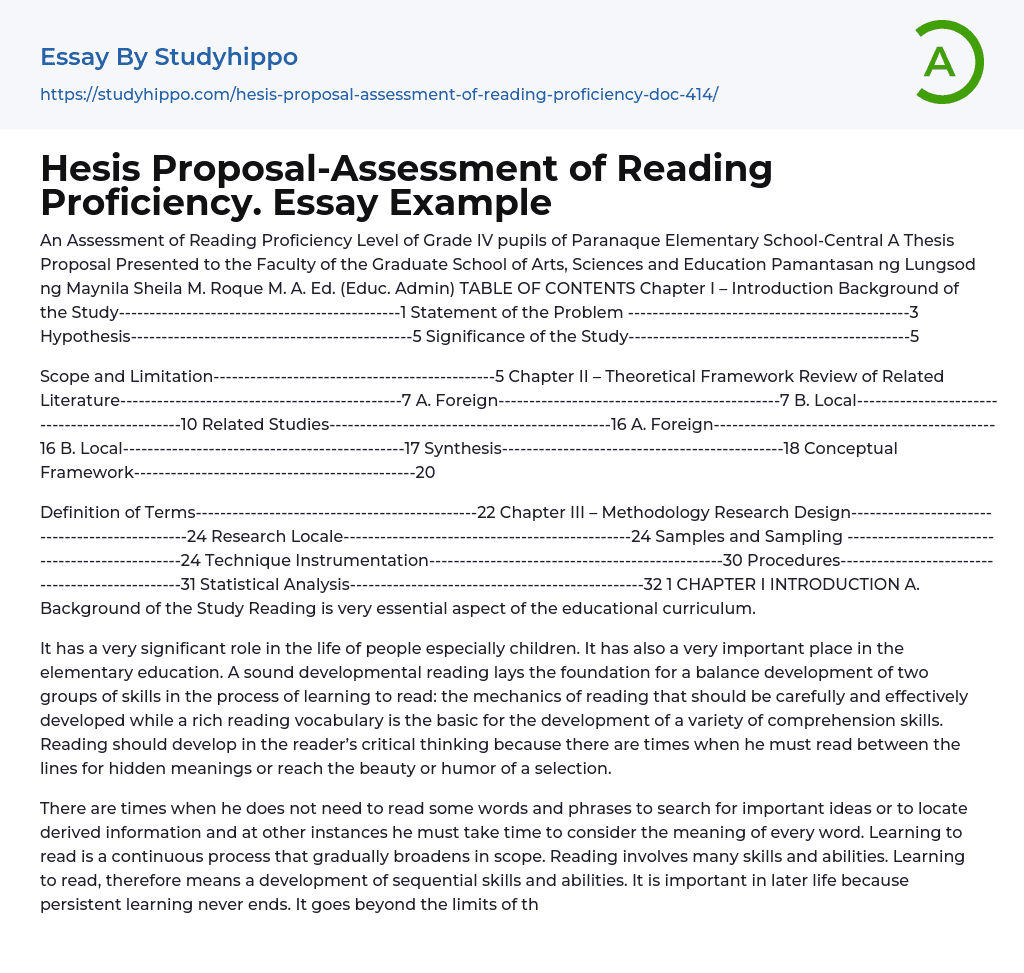It has a very significant role in the life of people especially children. It has also a very important place in the elementary education. A sound developmental reading lays the foundation for a balance development of two groups of skills in the process of learning to read: the mechanics of reading that should be carefully and effectively developed while a rich reading vocabulary is the basic for the development of a variety of comprehension skills. Reading should develop in the reader’s critical thinking because there are times when he must read between the lines for hidden meanings or reach the beauty or humor of a selection.
There are times when he does not need to read some words and phrases to search for important ideas or to locate derived information and at other instances he must take time to consider the meaning of every word. Learning to
...read is a continuous process that gradually broadens in scope. Reading involves many skills and abilities. Learning to read, therefore means a development of sequential skills and abilities. It is important in later life because persistent learning never ends. It goes beyond the limits of the school.
It continually offers the reader a new experiences and delightful adventures, present him with new knowledge and inspires him to reach the heights of achievements and self-improvement. Many skills and abilities needed in later life are started and developed as early as the elementary grades, so effective reading which likes its foundation in the primary grades, should be carefully planned, skillfully guided and thoroughly prepared.
One of the biggest problems encountered by an English teacher is the low reading performance of his/her pupils. Readin
involves two main skills, namely recognition and comprehension. Generally, pupils have lower performance in comprehension than in recognition. Everybody agrees that, “there is no reading without comprehension. ” Development of reading ability and increased comprehension skills need greater emphasis in learning. To achieve this goal, the teachers need to assess the pupils’ ability in reading. This is the rationale of the implementation on the use of Phil. Informal Reading Inventory (PHIL-IRI). It is a unified and standardized assessment tool supporting the DepEd thrust, “Every Child a Reader Program (ECARP).
This program aimed at making a child a reader by the end of Grade III. PHIL-IRI gives both quantitative and qualitative information about the pupils’ reading capabilities. Quantitative information shows the reading levels which include frustration, instructional and independent levels, while qualitative information reveals word recognition, patterns of errors, comprehension strengths and difficulties as well as reading behaviors and attitudes and the measurement of reading growth overtime (IRI Manual 2000). It is important that the teachers should be able to determine the reading level of his/her pupil to enable one to decide on the plans and remedies to be instituted.
The teacher may provide different exercises to those who belong to frustration and instructional and provide advance work to those in the independent level. Pupils under frustration level should be given the simplest reading materials; and generally reading it more complicated until they become an independent reader. Those who belong to Instructional level will be given more complicated reading materials, while those in the independent level should be provided with variety of reading materials and exercises that will challenge their capabilities and making them more independent.
In this, English
has become the leading medium for the transmission of information and knowledge in the conduct of business and international communication (Modern Teacher, 2002). With this, it can be noticed that Filipinos love their language advantage (superiority of usage of English compare to other Asian countries. ). This was revealed by low results in various tests conducted in English. Baysa (1999) stated in his analysis on the 1998 National Elementary Achievement Test that English is the weakest area. Poor reading has always been the complaint of many teachers particularly in the Grade IV level of Paranaque Elementary School-Central.
The failure in reading is declining to everyone. The poor readers cannot get what they should even if they read carefully and do their best. Still more importantly, the rest of the class is held back while the teacher tries hard to do something for the poor reader up to the poor group. Thus, the total loss in time and in educational values which poor readers cause in our school system is enormous. And the loss is happiness, self-confidence and security on the part of the poor reader is beyond calculation. With this concern for the enhancement of the English instruction, this study will be conducted.
Need to strengthen pupils’ English language capabilities, in particular to improve the reading comprehension of pupils in the basic education as the main concern or goal in the conduct of this research.
- Academia essays
- Higher Education essays
- Language Learning essays
- Studying Business essays
- Education System essays
- Study essays
- First Day of School essays
- Scholarship essays
- Pedagogy essays
- Curriculum essays
- Coursework essays
- Studying Abroad essays
- Philosophy of Education essays
- Purpose of Education essays
- Brainstorming essays
- Educational Goals essays
- Importance Of College Education essays
- Brown V Board of Education essays
- The Importance Of Higher Education essays
- Online Education Vs Traditional Education essays
- Academic And Career Goals essays
- Academic Integrity essays
- Brown Vs Board Of Education essays
- Distance learning essays
- Technology in Education essays
- Vocabulary essays
- Writing Experience essays
- Importance of Education essays
- Early Childhood Education essays
- Academic Degree essays
- Academic Dishonesty essays
- School Uniform essays
- Academic writing essays
- Cheating essays
- Bachelor's Degree essays
- MBA essays
- College Life essays
- Grade essays
- Diploma essays
- Phonology essays
- Sentence essays
- Filipino Language essays
- Pragmatics essays
- Millennium Development Goals essays
- History Of Education essays
- Graduate School essays
- Middle School essays
- School essays
- Special Education essays
- University essays




